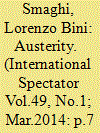| Srl | Item |
| 1 |
ID:
129942


|
|
|
|
|
| Publication |
2014.
|
| Summary/Abstract |
Policymakers in advanced economies tend to postpone reforms and budgetary adjustment, which are politically costly, until the deterioration of financial market sentiment makes these measures unavoidable. Such a strategy is economically costly and politically dangerous. It is costly because once market sentiment deteriorates confidence can be restored only through drastic and much more painful measures. Austerity can be avoided only with a credible reform agenda. The strategy is also dangerous because the argument that "there is no other alternative" cannot be repeated indefinitely by governments that fail to act earlier. The risk that citizens may be attracted to populist solutions increases.
|
|
|
|
|
|
|
|
|
|
|
|
|
|
|
|
| 2 |
ID:
074956


|
|
|
|
|
| Publication |
2006.
|
| Summary/Abstract |
By the end of 2001, Argentina faced economic recession, a collapse in its banking system, and an external sovereign debt crisis. While preemptive action earlier in the year might have made one or more of these crises less severe, preemption was a political orphan at home and abroad. The country's long-standing relationship with the International Monetary Fund brought with it a mutual dependence: the IMF had come to embrace Argentina as a symbol of the success of its policy advice, and Argentina had come to rely on the IMF's endorsement and occasional financial support to navigate the choppy international markets. That relationship deepened along with Argentina's growing difficulties in the run-up to default. IMF support was used to put off a correction of the overvalued currency and debt restructuring. A new Argentine policy regime and a new, more adversarial relationship with the IMF emerged only after devaluation and default.
|
|
|
|
|
|
|
|
|
|
|
|
|
|
|
|
| 3 |
ID:
097841


|
|
|
|
|
| Publication |
2010.
|
| Summary/Abstract |
This paper analyzes and assesses the "Principles for Stable Capital Flows and Fair Debt Restructuring in Emerging Markets," which have emerged as an important instrument for crisis prevention and crisis resolution in the international financial system. The paper argues that, notwithstanding their low profile, the Principles which were jointly agreed between key sovereign debtors and their private creditors in 2004 have proved to be a useful instrument in spite of their voluntary and non-binding nature. Indeed, an increasing number of sovereign debtors and private creditors have adopted the Principles' recommendations on transparency and the timely flow of information, close dialogue, "good faith" actions, and fair treatment. The paper, taking a rational choice perspective, appraises the Principles as the product of a transnational public-private partnership as well as a soft mode of governance. Moreover, it shows how the Principles have moved somewhat along the continuum of soft law and hard law toward the latter. Finally, the paper makes the case that the Principles and their design features can provide some lessons for the current international policy debate on codes of conduct in global financial regulation.
|
|
|
|
|
|
|
|
|
|
|
|
|
|
|
|